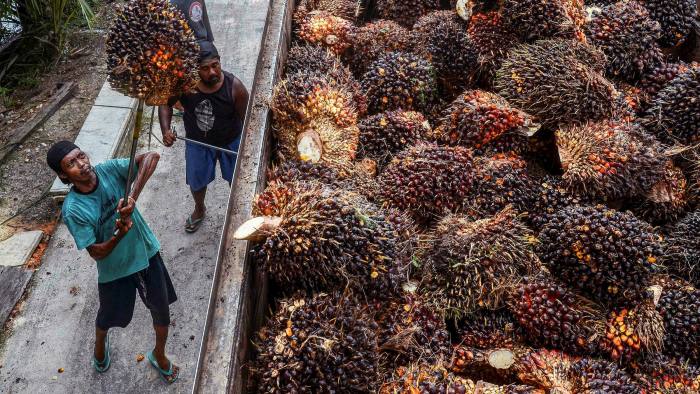
Indonesia palm oil export ban fuels global food inflation threat
 Indonesian workers transfer harvested palm fruits to a transport truck at a plantation in Pekanbaru. The country’s president Joko Widodo has announced a total ban for outbound shipments of palm oil © Wahyudi/AFP/Getty Images
Indonesian workers transfer harvested palm fruits to a transport truck at a plantation in Pekanbaru. The country’s president Joko Widodo has announced a total ban for outbound shipments of palm oil © Wahyudi/AFP/Getty Images We’ll send you a myFT Daily Digest email rounding up the latest Food Prices news every morning.
Palm oil prices shot higher and the Indonesian rupiah lost ground on Monday after Jakarta levied a blanket ban on exports of the edible oil in a bid to contain surging food prices as a result of the war in Ukraine.
The move by Indonesia, the world’s biggest exporter of palm oil, is the latest food export ban being implemented by countries around the world suffering from soaring food prices.
“This is yet another reminder of the vulnerability present across agricultural supply chains in an environment of already historically tight inventories, compounded by the indefinite loss of Ukrainian export volumes and historically high production costs,” said Tracey Allen, a JPMorgan analyst in London.
Agricultural commodity prices have jumped after exports from Ukraine, a leading grain and sunflower oil supplier to world markets, stopped due to the war.
Benchmark wheat prices in Chicago have risen 21 per cent while corn has added 15 per cent, leading to higher food import bills for countries reliant on international markets for their grains.
Vegetable oil prices have also shot up, with retailers in many countries starting to ration supplies. The UN Food and Agricultural Organization’s vegetable oil price index has surged 40 per cent this year.
The tight vegetable oil market has forced retailers to start rationing cooking oil. Supermarkets in some European countries last month started limiting the amount of cooking oil customers can buy, while leading UK retailers such as Tesco and Waitrose followed suit over the past few days.
Indonesian president Joko Widodo announced a total ban for outbound shipments of the oil on Friday. As markets reopened on Monday, palm oil traded in Malaysia jumped as much as 7 per cent to 6,800 ringgit a tonne before falling back to 6,217 ringgit.
The Indonesian rupiah, which has been largely stable this year despite pressure on emerging markets from anticipated US rate rises, also dropped 0.7 per cent to 14,455 per dollar, marking the sharpest daily fall in half a year.
Although the restrictions would probably bring down prices in Indonesia, they would drive up prices for importers, including India and China, said one analyst. “Clearly this is a negative for the global consumer.”
The ban also spurred a sell-off for Indonesian palm oil producers, with Jakarta-listed Triputra Agro Persada falling about 7 per cent and rival Astra Agro Lestari down more than 4 per cent.
Indonesia was already struggling with a domestic palm oil shortage before the invasion of Ukraine, piling pressure on the government to act as the world’s largest Muslim population prepares for feasting during the Eid al-Fitr holiday, known locally as Lebaran.
Earlier this month, students took to the streets to protest rising inflation, as well as rumours that Jokowi, as the president is popularly known, would seek a third term.
The export ban, which will take effect on Thursday, marks the latest protectionist move by Jokowi’s government, which had already introduced requirements that producers devote a portion of output to domestic markets and recently raised Indonesia’s palm export levy.
Analysts said the new restrictions had been introduced ahead of Lebaran holiday in early May. “We believe the suspension would be lifted soon after the passing of the Lebaran festive period, as consumption demand is set to normalise thereafter,” said Lester Siew, an analyst at Citigroup.
Additional reporting by Neil Hume in London
{"focus":["0c11b954-798b-4d35-a369-6d5508fe4f2b","51379838-c026-4cd2-8dfb-da63f7d0b123","573cc1d3-b359-4548-a69a-4aa0b3818c1b","6593e3b2-8dbf-4e6b-85a8-d91ee6099c81","9ab8e36c-4b79-4e96-9aae-cc586b7d19c4","9d4881fa-f11b-4bb8-9746-2a8271b14a4f","a579350c-61ce-4c00-97ca-ddaa2e0cacf6","19cdfa47-8492-4935-9c46-0c20a18186d2","1b0e0dc0-21f2-4216-8c14-1204b0ae26d8","29e67a92-a3b8-410c-9139-15abe9b47e12","67fb70ae-b970-4bd1-92ea-761618ae8cb7","82645c31-4426-4ef5-99c9-9df6e0940c00","af42a8b7-a1f6-4c86-9df6-41e74266f541","c47f4dfc-6879-4e95-accf-ca8cbe6a1f69","c91b1fad-1097-468b-be82-9a8ff717d54c","d6ef525b-e51c-4f81-b105-eb11ec6808ad","ec4ffdac-4f55-4b7a-b529-7d1e3e9f150c","fab33c6e-17a3-4c4b-b457-1c8e7aceff6d"],"authorConcepts":["7c1ffc26-4464-4cb2-b11a-c40505444901","c48dda83-da66-47cc-90df-c761ef10809d","e1cf482c-de60-4b0e-a906-350ca168b88b"],"displayConcept":"0c11b954-798b-4d35-a369-6d5508fe4f2b"}Get alerts on Food Prices when a new story is published
Get alerts // Snippet copied with modification from: // https://support.google.com/surveys/answer/6172863?hl=en&ref_topic=6172724 (function() { var ARTICLE_URL = window.location.href; var CONTENT_ID = 'everything'; var scriptEl = document.createElement('script'); scriptEl.src = '//survey.g.doubleclick.net/survey?site=_ykzfqallocklxfmrw3y6sankbe' + '&url=' + encodeURIComponent(ARTICLE_URL) + (CONTENT_ID ? '&cid=' + encodeURIComponent(CONTENT_ID) : '') + '&random=' + new Date().getTime() + // This loads survey scripts which do not use document.write()! '&after=1'; document.head.appendChild(scriptEl); })();Copyright The Financial Times Limited 2022. All rights reserved.Reuse this content (opens in new window) CommentsJump to comments sectionPromoted Content Follow the topics in this article- Food Prices Add to myFT
- Commodities Add to myFT
- Global inflation Add to myFT
- Food security Add to myFT
- Agricultural commodities Add to myFT
Owl Media Group takes pride in providing social-first platforms which equally benefit and facilitate engagement between businesses and consumers and creating much-needed balance to make conducting business, easier, safer, faster and better. The vision behind every platform in the Owl Media suite is to make lives better and foster a healthy environment in which parties can conduct business efficiently. Facilitating free and fair business relationships is crucial for any thriving economy and Owl Media bridges the gap and open doors for transparent and successful transacting. No advertising funds influence the functionality of our media platforms because we value authenticity and never compromise on quality no matter how lucrative the offers from advertisers may seem.
Originally posted on: https://www.ft.com/content/38b6df62-e863-4ba1-8274-138ccb2b061b